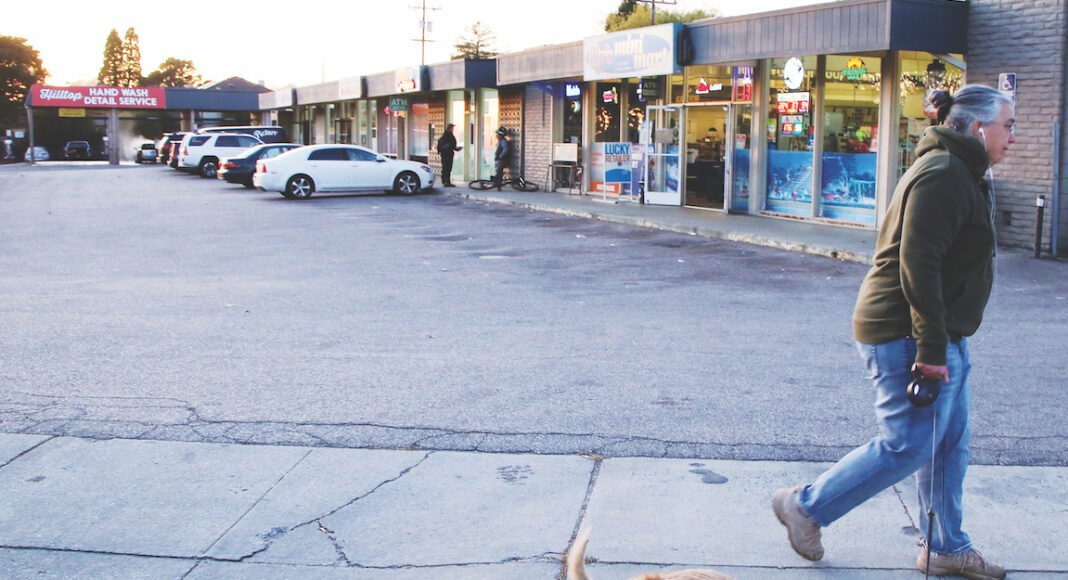The Santa Cruz City Council will reconsider a large affordable housing project after receiving multiple threats of litigation following its near unanimous decision to reject the proposal in October.
The project, which was submitted to the city on July 1, would consist of two mixed-use buildings with 145 residential apartments at 831 Water St. Of those units, 69 would be considered “affordable,” meaning they would be deed-restricted to people who make 80% or less of the area’s median income.
The developers submitted the application under Senate Bill 35, a bill passed in 2017 that aims to streamline affordable housing projects. SB35 applies to cities that have not met their affordable housing mandates imposed by the state, and limits a municipality’s ability to deny housing proposals.
Although the city of Santa Cruz has surpassed its state mandates for affordable housing units at low, moderate and above-moderate income levels, it is behind on its affordable units at very low income levels. So far, Santa Cruz has only permitted 12 units that will be available to people in the very low income bracket; the state’s requirement for Santa Cruz is 180 of those units.
After the City Council voted 6-1 to deny the project in October—Sonja Brunner was the lone councilmember in favor of its construction—the California Department of Housing and Community Development submitted a letter to the city saying that its rejection of the project was illegal under SB35. It said that Santa Cruz needed to work with the developer on a “speedy resolution of this matter.”
Attorney Darcy Pruitt at the City Council’s Nov. 23 meeting said that in other cities, denying SB35 projects resulted in multi-million dollar court cases. Often, she said, the court rules in favor of the project and the city is compelled to accept the proposals.
Around 15 people called in to the meeting, both in support of and in opposition to the project. Councilmembers Justin Cummings and Sandy Brown both maintained their previous votes in opposition to the proposal. Brown and Cummings said that since the developers have submitted multiple iterations of their original proposal, they should submit a new application that is clear and consistent. Otherwise, there is no guarantee they won’t change their application again, the councilmember said.
“It’s unfair to the public and undermines the integrity of the planning process to allow continual revisions to an application,” Cummings said. “Public policy decisions should not be made on the basis of a threat of a lawsuit.”
Brown also mentioned that the time city staff has spent reviewing the additional documents the developers submitted—documents she says have often been contradictory—has been excessive.
“I believe we met our obligations under SB35 to give developers the opportunity to provide evidence that this project would meet objective standards,” Brown said.
Mayor Donna Meyers, Vice Mayor Brunner and council members Renee Golder and Shebreh Kalantari-Johnson voted in favor of reconsidering the project. Councilmember Martine Watkins was absent.
Kalantari-Johnson said she wanted time to re-evaluate the new proposal, and thought that since there was public support for the project, there should be a public meeting on the matter.
There will be a public hearing on Dec. 14, during the City Council’s last meeting of the year, to reconsider the proposal.
The City Council was also set to hold a study session on its state mandated housing goals and development standards on Tuesday.
When the City Council first heard the proposal in October, the majority of council members were concerned that all of the affordable housing units were grouped in one building, and all the market rate units were in the second building.
Watkins during the October meeting called it a “segregated housing proposal,” and said it was “personally offensive.”
That wasn’t the City Council’s only grounds for rejecting the project. It also said that it had not complied with the city’s objective standards it sets forth for housing proposals, such as providing plans for a drainage system and a noise and traffic study.
After the denial, the developers submitted additional documents to address some of the elected leaders’ concerns. Along with redistributing the affordable units across the two buildings, the developer also submitted noise studies and a drainage plan.
In other action, the City Council voted 6-0 to have Brunner take over as mayor for 2022. Watkins will be the new Vice Mayor.
Brunner, the Downtown Association’s operations director, was voted into office in 2020. She received the most votes of nine candidates in the Nov. 3 election in which Watkins, Brown and Kalantari-Johnson were also elected.















Aiyana,
We are deeply concerned about this article and are requesting a correction or at least a clarification. I represent Novin Development, who is building the 831 Water Street project. Besides the overall tone of the article, which certainly read anti-development of the project, there were a couple of factual errors.
1. In the lead paragraph, as well as headlines, we know of no threat of litigation except for YIMBY’s.
2. Novin did not wait for “After the denial, the developers submitted additional documents to address some of the elected leaders’ concerns.” Novin submitted supplemental materials on 10/13 and 10/14 PRIOR to the 10/14 5pm deadline to address ALL of the original council denial concerns. City staff did not release those in time for the Council to review, apparently.
3. Finally, most concerning, there was no comment from anyone at Novin Development in the article at all. Iman Novin has repeatedly made himself available to talk to press or project opponents. The fact neither he nor anyone else from Novin Development shows a severe slant in the reporting of this article.
We would appreciated a response from you or your editor as soon as possible, and a print and online correction or clarification.
Best,
Peggy Spear
Communications Development, Novin Development
Pe*********@gm***.com